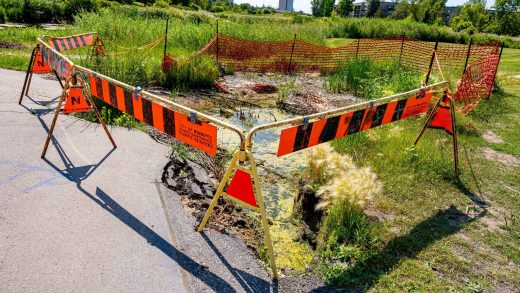
TORONTO – Ten-year-old Ofri Brodutch had barely been released from weeks of captivity by Hamas in the Gaza Strip before she began talking about her next trip to Canada.
But her uncle, Israeli-born, Toronto-based scientist Aharon Brodutch, says her excitement at the prospect of another summer spent visiting her Canadian cousins contrasts sharply with the rest of her current physical and mental state.
Ofri, her two younger brothers and their mother all bear visible signs of the ordeal they faced since they were taken hostage by Hamas on Oct. 7 as part of a brutal incursion that killed roughly 1,200 Israelis and touched off a war that has now raged for nearly two months. Israel’s retaliatory attacks in the Gaza Strip have killed more than 15,500 people, according to local health authorities, which do not distinguish between civilian and combatant deaths.

The four members of the Brodutch family were among roughly 100 hostages released last week during a seven-day truce that saw some Israeli captives freed in exchange for Palestinians held in Israeli prisons, and Aharon Brodutch took part in the bitter-sweet reunion in person at an Israeli hospital.
“They’re functioning,” Brodutch said in a phone interview. “It’s very hard for them to speak about what had happened because it’s extremely traumatizing. When they came back, they had lost a lot of weight. They look bad.”
Aharon Brodutch, 44, was at his home in Toronto on Oct. 7 when he began to hear of unusual activity from his younger brother Avihai. Avihai’s texts, sent from his home in the Kfar Aza kitbutz near the Gaza border, described stepping outside and witnessing two Hamas militants paragliding into the community.
Avihai ran back inside to warn his family, only to hear a knock on the door. Standing on the doorstep was the three-year-old daughter of his neighbours and best friends, drenched in her parents’ blood and seeking help.
Aharon Brodutch said his brother asked his wife to take care of the girl before rushing to a local armoury in search of weapons. En route he witnessed close friends die in combat with Hamas militants and got a text from his wife indicating some were entering the family home. By the time he returned, the house was empty.
The Brodutch family feared the worst and believed their loved ones had been killed, only to learn a day and a half later that there was still hope.
“We discovered that someone had seen them being taken outside, put in a car and the terrorists drove them to Gaza,” Aharon Brodutch said of his sister-in-law Hagar, niece Ofri and nephews eight-year-old Yuval and four-year-old Uriah.
He flew to Israel a few days later to be with his brother and strategize on how best to help their kidnapped relatives.
Aharon Brodutch said the Israeli government initially seemed focused more on destroying Hamas than on freeing hostages. He and his brother began sitting outside military headquarters carrying signs, and Aharon’s daughter began writing letters to the United Nations and “anyone who would listen” to voice concerns for her relatives and other hostages.
A breakthrough came when Israel and Hamas agreed to a temporary ceasefire in order to swap limited numbers of hostages and prisoners. The Brodutch family members were freed on Nov. 26 without serious injuries but with extreme mental trauma and in the same clothes they were wearing when they were taken. Their three-year-old neighbour was also released.
Aharon Brodutch said he can’t share all details of what his relatives went through for fear of compromising the safety of those still held captive, but said his nephews, in particular, are struggling.
While Yuval slightly understood what had happened, four-year-old Uriah had no clue.
“He didn’t understand what was happening apart from the fact that he was just being very badly treated, but he didn’t understand why.” Brodutch said, adding praise for his sister-in-law’s care of the children during their ordeal
He said his relatives now have temporary housing from the Israeli government, but are wrestling with what to do next as the war rages on. Israeli officials announced on Sunday that the military ground operation in the Gaza Strip, previously most intense in the north, would expand to the entire enclave where millions of people remain trapped or displaced.
Brodutch said the Oct. 7 attack has destroyed any sense of security his family once felt in the kibbutz they called home.
“(It’s) a very close community and more than 50 people were killed from the kibbutz (in the Oct. 7 attack). It’s a huge chunk of this community that was destroyed,” he said.
And while another summer vacation in Toronto for Ofri may be easy to arrange, Aharon Brodutch said her family’s more immediate steps in their native country are less clear.
“It’s going to be very hard for them to come back home.”
This report by The Canadian Press was first published Dec. 3, 2023.


